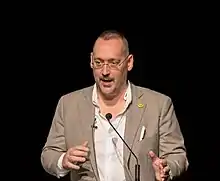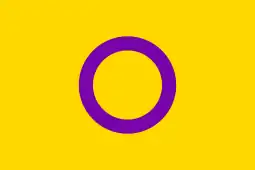Morgan Carpenter
Morgan Carpenter is a bioethicist, intersex activist and researcher.[1] In 2013, he created an intersex flag,[2] and became president of Intersex Human Rights Australia (formerly OII Australia).[3] He is now a co-executive director.[4] In 2015, he cofounded a project to mark Intersex Awareness Day.[5]
Morgan Carpenter | |
|---|---|
 | |
| Born | 1966 |
| Nationality | Australian |
| Known for | Bioethicist, intersex flag, co-executive director of Intersex Human Rights Australia |
| Website | morgancarpenter |
Background
Carpenter is a graduate of the bioethics program at the University of Sydney and also holds qualifications from the University of Technology, Sydney, Dublin City University and Coventry University.[1] His intersex status was diagnosed as an adult, described as including a diagnosis of "indeterminate sex",[6] and a surgical history.[7][8]
Activism
Morgan Carpenter helped found Intersex Human Rights Australia[4] and became president of the organisation in September 2013.[4][9] Carpenter wrote the organization's submissions to Senate inquiries, appearing before a Senate hearing on anti-discrimination legislation during activities that led to the adoption of an "intersex status" attribute in anti-discrimination law on 1 August 2013,[10][11] and a Senate committee inquiry on the involuntary or coerced sterilisation of people with disabilities and intersex people.[12][13]
Carpenter contributes to work on reform of international medical classifications[14] and medical practices within Australia.[15] He is named as a reviewer for a DSD Genetics website funded by the National Health and Medical Research Council, Australia,[16] and has also authored critiques of eugenic selection against intersex traits,[17][18] and clinical research priorities.[19] He speaks out against stigma,[20] and has spoken out on issues affecting women purported to have intersex traits in competitive sport.[21][22][23]
Carpenter took part in the first United Nations expert meeting on ending human rights violations against intersex people in 2015[24][25] In the same year, he founded a project to mark Intersex Awareness Day.[5] Carpenter was also a drafting committee member and signatory of the 2017 Yogyakarta Principles plus 10, on the application of international human rights law in relation to sexual orientation, gender identity, gender expression and sex characteristics.[26]
Carpenter has been published by The Guardian,[27] SBS,[28] Australian Broadcasting Corporation,[29] and other media.[30]

Intersex flag
An Intersex flag was created in July 2013 by Carpenter as a flag "that is not derivative, but is yet firmly grounded in meaning".[2] Describing the flag for Intersex Human Rights Australia, Carpenter wrote:
The circle is unbroken and unornamented, symbolising wholeness and completeness, and our potentialities. We are still fighting for bodily autonomy and genital integrity, and this symbolises the right to be who and how we want to be.
— Morgan Carpenter
Academic work
With recognition of non-binary gender identities in Australian regulations, and German birth certificates, Carpenter expressed concern that such developments are "not a solution" to the needs of intersex people.[31][32] In 2018, he wrote that:
In practice, intersex bodies remain "normalized" or eliminated by medicine, while society and the law "others" intersex identities. That is, medicine constructs intersex bodies as either female or male, while law and society construct intersex identities as neither female nor male.[33]
Carpenter argues that claims that medicalization "saves intersex people" from being framed as the "other", while "legal othering saves intersex people from medicalization are contradictory and empty rhetoric".[33]
In an article on the Yogyakarta Principles and relationships between intersex and LGBT populations, Carpenter stresses inadequacies and "dangerous" consequences from framing intersex as a sexual orientation or gender identity issue, inviting legislative enactment of protections on grounds of sex characteristics.[34]
Selected bibliography
Books and book chapters
- Carpenter, Morgan (January 2020). "Intersex". In Lynette Spillman (ed.). Oxford Bibliographies in Sociology. New York: Oxford University Press. doi:10.1093/OBO/9780199756384-0232. ISBN 978-0-19-975638-4.
- Carpenter, Morgan (September 2018). "The 'normalisation' of intersex bodies and 'othering' of intersex identities". In Jens Scherpe; Anatol Dutta; Tobias Helms (eds.). The Legal Status of Intersex Persons. Cambridge, England: Intersentia. pp. 445–514.
- Cabral Grinspan, Mauro; Carpenter, Morgan (2018). "Gendering the Lens: Critical Reflections on Gender, Hospitality and Torture". Gender Perspectives on Torture: Law and Practice. Center for Human Rights & Humanitarian Law, Washington College of Law, American University. pp. 183–96.
- Jones, Tiffany; Hart, Bonnie; Carpenter, Morgan; Ansara, Gavi; Leonard, William; Lucke, Jayne (February 2016). Intersex: Stories and Statistics from Australia. Cambridge, UK: Open Book Publishers. ISBN 978-1-78374-208-0. Retrieved 20 May 2016.
- Carpenter, Morgan; Hough, Dawn (2014). Employers' Guide to Intersex Inclusion. Sydney, Australia: Pride in Diversity and Organisation Intersex International Australia. ISBN 978-0-646-92905-7. Archived from the original on 25 April 2016. Retrieved 21 May 2016.
- Carpenter, Morgan; European Foundation for the Improvement of Living and Working Conditions; Nexus Research Co-operative (1998). The employment of people with disabilities in small and medium-sized enterprises (PDF). Dublin, Ireland: European Foundation for the Improvement of Living and Working Conditions. ISBN 978-92-828-2949-3.
Journal articles
- Carpenter, Morgan (1 September 2020). "Caster Semenya's life and achievements are cause for celebration, respect and inclusion; her exclusion is consequential". Journal of Medical Ethics. 46 (9): 593–594. doi:10.1136/medethics-2020-106506. ISSN 0306-6800. PMID 32792348. S2CID 221126098.
- Carpenter, Morgan (2020). "Intersex human rights, sexual orientation, gender identity, sex characteristics and the Yogyakarta principles plus 10". Culture, Health & Sexuality. 23 (4): 516–532. doi:10.1080/13691058.2020.1781262. ISSN 1369-1058. PMID 32679003. S2CID 220631036.
- Carpenter, Morgan (2020). "The OHCHR background note on human rights violations against intersex people". Sexual and Reproductive Health Matters. 28 (1): 1–4. doi:10.1080/26410397.2020.1731298. ISSN 2641-0397. PMC 7888051. PMID 32204689.
- Karkazis, Katrina; Carpenter, Morgan (2018). "Impossible "choices": The inherent harms of regulating women's testosterone in sport". Journal of Bioethical Inquiry. 15 (4): 579–587. doi:10.1007/s11673-018-9876-3. ISSN 1872-4353. PMID 30117064.
- Carpenter, Morgan (2018). "Intersex variations, human rights, and the International Classification of Diseases". Health and Human Rights. 20 (2): 205–214. ISSN 2150-4113. PMC 6293350. PMID 30568414.
- Carpenter, Morgan (2018). "The 'normalization' of intersex bodies and 'othering' of intersex identities in Australia". Journal of Bioethical Inquiry. 15 (4): 487–495. doi:10.1007/s11673-018-9855-8. ISSN 1872-4353. PMID 29736897.
- Carpenter, Morgan (May 2016). "The human rights of intersex people: addressing harmful practices and rhetoric of change". Reproductive Health Matters. 24 (47): 74–84. doi:10.1016/j.rhm.2016.06.003. ISSN 0968-8080. PMID 27578341.
Recognition
In 2013, Australia's Gay News Network included Carpenter in their "LGBTI people to watch in 2014".[35]
References
- "Morgan Carpenter". Retrieved 16 September 2016.
- "An intersex flag – Intersex Human Rights Australia". ihra.org.au. 5 July 2013. Retrieved 20 June 2022.
- Carpenter, Morgan (4 March 2018). "We are now "Intersex Human Rights Australia"". Intersex Human Rights Australia. Retrieved 31 March 2018.
- "Our Board". Intersex Human Rights Australia. 12 October 2013.
- "Credits". Intersex Day Project. Archived from the original on 10 May 2021. Retrieved 16 September 2016.
- Carpenter, Morgan (May 2016). "The human rights of intersex people: addressing harmful practices and rhetoric of change". Reproductive Health Matters. 24 (47): 74–84. doi:10.1016/j.rhm.2016.06.003. ISSN 0968-8080. PMID 27578341.
- "Intersex health – Morgan Carpenter's presentation to Health in Difference conference". OII Australia. 22 April 2013.
- Safran, John; Maguire, Father Bob (May 2014). "04/05/2014". Sunday Night Safran. Triple J.
- "Changes At OII As Trailblazer Gina Wilson Retires". Star Observer. 13 September 2013.
- "We welcome the Senate Inquiry report on the Exposure Draft of the Human Rights and Anti-Discrimination Bill 2012". Intersex Human Rights Australia. 21 February 2013.
- "On the historic passing of the Sex Discrimination Amendment (Sexual Orientation, Gender Identity and Intersex Status) Act 2013". Intersex Human Rights Australia. 25 June 2013.
- "Forced intersex surgery 'genital mutilation'". Star Observer. 24 July 2013.
- "Senate Inquiry reveals forced surgery on intersex children". Gay News Network. 25 September 2013. Archived from the original on 10 November 2013.
- Cabral, Mauro; Carpenter, Morgan (2014). "Intersex Issues in the International Classification of Diseases: a revision" (PDF). Retrieved 20 May 2016.
- Topsfield, Jewel (15 September 2018). "Inquiry into human rights of intersex people". Sydney Morning Herald.
- "Disorders of Sex Development Research Website". University of Queensland, Murdoch Children's Research Institute, and Prince Henry's Institute of Medical Research. 9 October 2014. Retrieved 9 October 2013.
- Council of Europe; Commissioner for Human Rights (April 2015). Human rights and intersex people, Issue Paper. p. 54.
{{cite book}}:|work=ignored (help) - Carpenter, Morgan; Organisation Intersex International Australia (30 April 2014). "Submission on the Review of Part B of the Ethical Guidelines for the Use of Assisted Reproductive Technology in Clinical Practice and Research, 2007". Sydney: Intersex Human Rights Australia. Retrieved 20 May 2016.
- Carpenter, Morgan (21 October 2015). "Intersex-related research must have direct input from intersex community". Star Observer. Sydney. Retrieved 20 May 2016.
- Chaleyer, Rani (10 March 2015). "Intersex: the I in LGBTI". SBS The Feed. Special Broadcasting Service.
- Brook, Benedict (16 August 2016). "There should be no questions about Caster Semenya's right to compete at the Olympics, say experts". News.com.au. Retrieved 16 September 2016.
- Stewart, Erin (17 August 2016). "Haters and hyperandrogenism: Caster Semenya's road to becoming an Olympic favourite". Special Broadcasting Service. Retrieved 16 September 2016.
- Human Rights Watch (2020). "They're Chasing Us Away from Sport" Human Rights Violations in Sex Testing of Elite Women Athletes. New York City: Human Rights Watch. ISBN 978-1-62313-880-6.
- Wade, Matthew (24 September 2015). "Intersex rights addressed at the UN Human Rights Council for the first time". Star Observer.
- Carpenter, Morgan (2020). "The OHCHR background note on human rights violations against intersex people". Sexual and Reproductive Health Matters. 28 (1): 1–4. doi:10.1080/26410397.2020.1731298. ISSN 2641-0397. PMC 7888051. PMID 32204689.
- "Yogyakarta Principles plus 10". Archived from the original on 1 December 2017.
- Carpenter, Morgan (18 June 2013). "Australia can lead the way for intersex people". The Guardian. Retrieved 20 May 2016.
- Carpenter, Morgan (16 March 2015). "Comment: 'Curing' intersex is damaging and common". Special Broadcasting Service The Feed. Retrieved 20 May 2016.
- Carpenter, Morgan (15 November 2013). "It's time to defend intersex rights". Sydney: Australian Broadcasting Corporation. Retrieved 20 May 2016.
- Carpenter, Morgan (13 March 2014). "Intersex explained and the issues that confront us". Sydney: Star Observer. Retrieved 20 May 2016.
- "Third sex option on birth certificates". Deutsche Welle. 1 November 2013.
- Cox, Lisa (28 November 2013). "ACT government bill will introduce wider gender identification". Canberra Times.
- Carpenter, Morgan (2018). "The 'normalization' of intersex bodies and 'othering' of intersex identities in Australia". Journal of Bioethical Inquiry. 15 (4): 487–495. doi:10.1007/s11673-018-9855-8. ISSN 1872-4353. PMID 29736897.
- Carpenter, Morgan (2020). "Intersex human rights, sexual orientation, gender identity, sex characteristics and the Yogyakarta principles plus 10". Culture, Health & Sexuality. 23 (4): 516–532. doi:10.1080/13691058.2020.1781262. ISSN 1369-1058. PMID 32679003. S2CID 220631036.
- "LGBTI people to watch in 2014". Gay News Network. 1 January 2014. Archived from the original on 3 January 2014. Retrieved 3 January 2014.